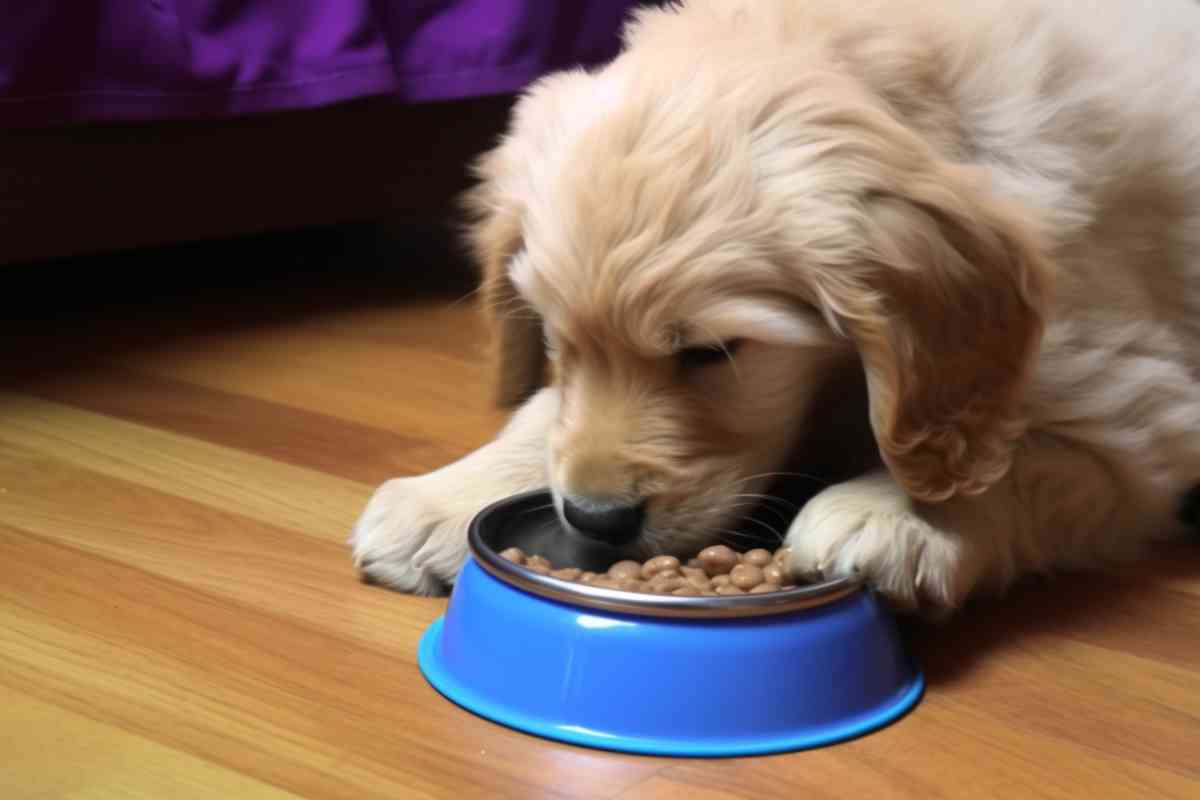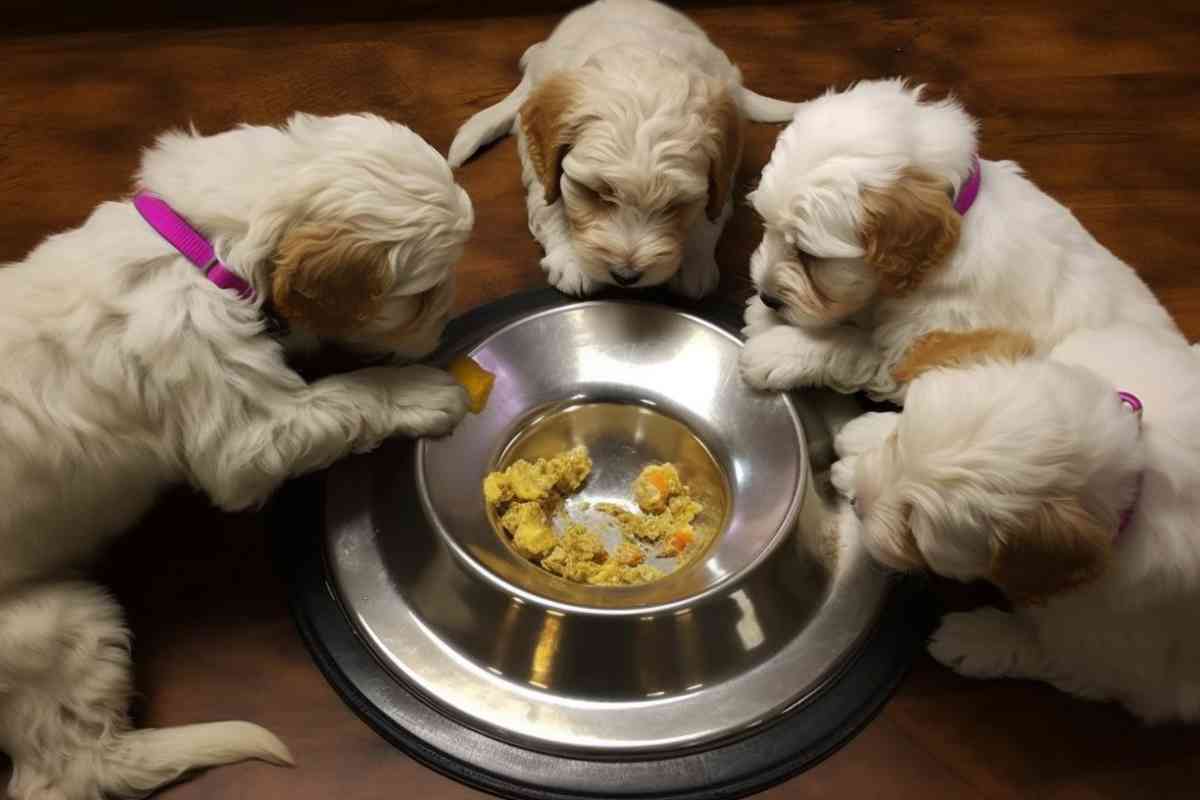What to Feed Your Goldendoodle Puppy: Expert Recommendations for Optimal Nutrition
Goldendoodles aren’t like other breeds, not when it comes to cute levels (come on, we all know they’re the cutest), and not when it comes to what they eat. I dug deep into the research to learn what to feed your Goldendoodle puppy to set them up for success and prevent some common diseases the breed is prone to.
I’ll go over the essential nutrients your Goldendoodle puppy needs, how their dietary requirements change as they grow, and how diet can help manage and prevent common Goldendoodle health concerns.
I’ll also provide recommendations for high-quality commercial foods, fresh food options, and beneficial supplements.

What to Feed Your Goldendoodle Puppy?
Feed your Goldendoodle puppy a balanced diet with high-quality animal protein, complex carbohydrates, healthy fats, fruits, vegetables, and fiber. Supplements like glucosamine and chondroitin, omega-3 fatty acids, probiotics, and antioxidants can also be beneficial in preventing diseases that Goldendoodles are prone to.
Feeding your Goldendoodle puppy the right food is crucial for their growth and overall health. Understanding the best and worst foods for a Goldendoodle diet can help you make informed choices as they age.
Taking care of a Goldendoodle puppy involves a lot more than feeding them the right food. Here are some veterinarian tips on how to take care of a Goldendoodle puppy, which could be useful for new Goldendoodle owners.
What to Look for in Food for Your Goldendoodle Puppy and as They Age
As your Goldendoodle puppy grows and transitions into adulthood, their dietary requirements will change. For instance, puppies need more protein and fat to support their rapid growth and development.
As they mature, their growth slows, and so does their need for these nutrients. The size of your Goldendoodle (whether they are a standard, medium, or miniature) and their activity level will also influence their dietary needs.
Active dogs require more calories, while less active or older dogs may require fewer to prevent weight gain.
Here’s a breakdown of what Goldendoodles generally need in their food as puppies and adults.
Protein
High-quality animal protein should be the first ingredient in your Goldendoodle’s diet. This can come from sources like chicken, beef, fish, or lamb. Protein supports muscle development and overall growth.
The protein requirement for puppies is higher than for adult dogs because they are growing and developing. As per a study conducted by the National Institutes of Health, puppies require about 22% of their diet to be protein, while adult dogs require about 18%.
Carbohydrates
Choose complex carbohydrates like sweet potatoes, brown rice, or oats. These provide energy and are easier on your puppy’s digestive system than simple carbs. While dogs have no specific requirement for carbohydrates, they can efficiently utilize them as an energy source.
A study from Tufts University states that carbohydrates can provide necessary energy for dogs and are beneficial for gut health.
Fats
Healthy fats, like those from fish oil or flaxseed, provide essential fatty acids that support skin and coat health. They also aid in brain development.
According to a study published in the National Library of Medicine, fats are an essential nutrient that plays many important roles in a dog’s body, such as providing energy, transporting vitamins, and contributing to skin and coat health. The fat content in a puppy’s diet should be around 8%, while for adult dogs, it should be around 5%.
Fruits and Vegetables
These provide essential vitamins, minerals, and antioxidants that support immune health and can help prevent diseases like PRA. While there’s no specific study on the exact amount of fruits and vegetables that should be included in a dog’s diet, they are known to provide necessary vitamins and minerals.
They should be included in moderation and should not replace the primary components of the diet, such as protein.
Fiber
Fiber aids in digestion and can help prevent issues like Gastric Dilatation-Volvulus, also known as bloat or GDV. Look for sources like beet pulp, pumpkin, or carrots.
A study published in the National Library of Medicine suggests that dietary fiber can alter the function and composition of the gut-associated lymphoid tissue in dogs, which plays a crucial role in maintaining gut health.

Great Dry Food Options for Goldendoodle Puppies
If your Goldendoodle eats everything, there are specific steps you can take to manage this behavior. However, finding a food they like to fill them up is a good start.
Blue Buffalo Life Protection Formula Natural Puppy Dry Dog Food
Blue Buffalo’s Life Protection Formula is a great choice for Goldendoodle puppies due to its blend of high-quality protein, whole grains, and fruit and vegetables. It also includes LifeSource Bits, which are a precise blend of antioxidants, vitamins, and minerals selected by veterinarians and animal nutritionists to support immune system health, life stage requirements, and a healthy oxidative balance.
Hill’s Science Diet Dry Dog Food, Puppy, Chicken Meal & Barley Recipe
Hill’s Science Diet is known for its scientifically developed food. This particular recipe is designed for large breed puppies, making it a good choice for Goldendoodles. It contains optimal levels of calcium for controlled bone growth, a nutritional component very important in large breed puppies to ensure healthy development of bones and joints.
IAMS PROACTIVE HEALTH Smart Puppy Large Breed Dry Puppy Food
IAMS Proactive Health is designed with the nutritional needs of large breed puppies in mind. It contains 22 key nutrients that are found in a mother’s milk, including omega-3 DHA for brain development. It also has high-quality protein sourced from real chicken to help your puppy develop strong muscles.
Purina ONE SmartBlend Natural Puppy Dog Food
Purina ONE SmartBlend Natural Puppy Dog Food is a dual-defense antioxidant blend that includes Vitamins E and A along with minerals zinc and selenium in a 100% complete diet for your puppy. It also contains DHA, a nutrient found in mother’s milk, for vision and brain development.
Nutro Ultra Puppy Dry Dog Food
Nutro Ultra Puppy Dry Dog Food is crafted with high-quality protein and a blend of 15 vibrant superfoods like coconut, chia, kale, blueberries, and other quality ingredients. It’s free from chicken by-product meal, corn, soy, and wheat, and contains no artificial flavors or preservatives.

Great Dry Food Options for Mini Goldendoodle Puppies
Royal Canin Small Puppy Dry Dog Food
Royal Canin Small Puppy Dry Dog Food is designed to meet the high energy needs of small breed puppies during their short, intense growth period. It contains highly digestible proteins and a blend of dietary fibers to support digestive health.
Wellness Complete Health Natural Dry Small Breed Dog Food Small Breed Puppy Turkey, Salmon & Oatmeal
Wellness Complete Health Natural Dry Small Breed Dog Food offers balanced, natural nutrition specially formulated for small breed puppies. It features high-quality protein sources to support higher energy needs, and also includes fruits and vegetables for antioxidant support.
Fresh Food Options for Goldendoodle Puppies
Certain fruits, like bananas, eggs, cottage cheese, and chicken can be a healthy addition to your Goldendoodle puppy’s diet. Fresh diets are entirely composed of these kinds of human-quality ingredients.
Nom Nom
Nom Nom offers made-to-order meals for dogs using restaurant-quality ingredients. Each recipe is prepared in a human-grade kitchen, portioned to meet your dog’s caloric needs, and then delivered to your door. They offer a variety of recipes to choose from, and you can customize your dog’s meal plan based on their age, breed, weight, and health needs.
The Farmer’s Dog
The Farmer’s Dog offers fresh, human-grade dog food that is developed by board-certified veterinary nutritionists. Each meal plan is customized to your dog’s individual profile and pre-portioned in easy pour bags. They use USDA human-grade meats and fresh produce, and their recipes are free of preservatives and fillers.

Raw Food for Goldendoodle Puppies
Stella & Chewy’s
Stella & Chewy’s offers raw, grain-free, minimally-processed dog food which they claim to be as close as possible to a natural diet in the wild. Their food is made with responsibly sourced proteins and crafted in the USA.
It’s important to note that while some believe raw food diets are good for dogs, others believe they can pose health risks, such as the potential for bacterial contamination. It’s best to consult with a vet before switching your puppy to a raw food diet.
Supplements to Improve your Goldendoodle’s Diet
Glucosamine and Chondroitin
Glucosamine and chondroitin are supplements that support joint health and can be beneficial for breeds prone to hip and elbow dysplasia, like Goldendoodles.
A study published in the Journal of Veterinary Science found that these supplements can reduce symptoms of osteoarthritis in dogs. It’s generally safe to start these supplements at a young age, especially for larger breeds. However, it’s always best to consult with your vet for the appropriate dosage.
Doggie Dailies Glucosamine for Dogs is a soft chew that contains Glucosamine, Chondroitin, and a host of other beneficial ingredients like MSM and Hyaluronic Acid. It’s designed to support joint health, improve mobility, and enhance overall health. The chews are made in the USA in a factory that follows GMP guidelines.
The reason why this product is great for Goldendoodle puppies is because it not only provides the necessary Glucosamine and Chondroitin for joint health, but it also contains other beneficial ingredients that can support overall health.
The soft chew form makes it easy for puppies to consume. Plus, it has over 10,000 positive reviews on Amazon, indicating that many dog owners have found it beneficial for their pets.
Omega-3 Fatty Acids
Omega-3 fatty acids, particularly those found in fish oil, are beneficial for skin and coat health. They can also reduce inflammation, which can help manage conditions like atopic dermatitis.
A study published in the Journal of Veterinary Dermatology found that omega-3 fatty acids can reduce itching and self-trauma in dogs with atopic dermatitis. Omega-3 supplements can be started at a young age and continued throughout your Goldendoodle’s life.
Zesty Paws Pure Wild Alaskan Salmon Oil for Dogs is a liquid supplement derived from wild Alaskan salmon. It’s rich in Omega-3 and Omega-6 fatty acids, which can support skin and coat health, reduce inflammation, and promote overall health. The supplement is easy to administer, as it can be added directly to your dog’s food.
It’s great for Goldendoodle puppies is because it provides a high-quality source of Omega-3 fatty acids, which can support their skin and coat health. The liquid form makes it easy to adjust the dosage based on your puppy’s weight and specific needs.
Probiotics
Probiotics can support digestive health and may be particularly beneficial for breeds prone to gastrointestinal issues. According to a study published in the Journal of Animal Science and Biotechnology, probiotics can help manage diarrhea in dogs. Probiotics are generally safe for dogs of all ages, but the dosage may need to be adjusted based on your dog’s weight and specific needs.
Purina Pro Plan Veterinary Diets FortiFlora Probiotic Supplement is a probiotic supplement designed to promote a healthy gut and immune system in dogs. It contains a strain of probiotic that has been proven to promote intestinal health and balance. The supplement comes in a convenient powder form that can be easily mixed with your dog’s food.
The reason why this product is great for Goldendoodle puppies is because it can support their digestive health, which is particularly important for this breed that can be prone to gastrointestinal issues.
Antioxidants
Antioxidants can support immune health and may help prevent diseases like PRA. They can be found in many fruits and vegetables, but are also available as supplements. A study published in the Journal of Nutritional Science and Vitaminology found that antioxidant supplementation can improve retinal responses in dogs.
Zesty Paws Multivitamin Treats for Dogs are packed with a blend of vitamins, minerals, and antioxidants to help support the overall health of your dog. They contain ingredients like Vitamin A, Vitamin C, and CoQ10 which are known for their antioxidant properties.
The reason why this product is great for Goldendoodle puppies is because it can support their immune health and may help prevent diseases like PRA.

Common Goldendoodle Health Concerns and How Diet Can Help Prevent Them
Diet can play a significant role in preventing some of the most common diseases Goldendoodles are prone to. Here’s how diet and disease interact in Goldendoodles.
Hip Dysplasia
Hip dysplasia is a common skeletal condition, especially in large breeds like Goldendoodles. It occurs when the hip joint doesn’t form correctly, leading to arthritis and potential lameness. A study published by the National Library of Medicine suggests that diet can play a significant role in the development of this condition.
Overfeeding and rapid growth in puppies can increase the risk of hip dysplasia. Thus, it’s essential to feed your Goldendoodle a balanced diet that promotes slow, steady growth. Supplements like glucosamine and chondroitin can also support joint health.
Elbow Dysplasia
Elbow dysplasia is another joint issue that can affect Goldendoodles. It’s a complex condition that can lead to lameness and arthritis. Research published by the National Library of Medicine suggests that diet can influence the risk of elbow dysplasia. Certain supplements, like green-lipped mussel, can help manage joint pain in dogs with osteoarthritis, a common outcome of elbow dysplasia.
Atopic Dermatitis
Atopic dermatitis is a chronic skin disease that can cause itching, redness, and infections. It’s often linked to allergies, including food allergies. A study published by the National Library of Medicine suggests that diet can influence the gut microbiome, which in turn can impact skin health.
Feeding your Goldendoodle a diet rich in omega-3 fatty acids, like fish oil, can help promote healthy skin and reduce inflammation.
Progressive Retinal Atrophy (PRA)
PRA is a group of genetic diseases that cause the retina’s gradual deterioration, leading to blindness. While genetics play a significant role in PRA, diet can also influence eye health. A study published by the National Library of Medicine found that antioxidant supplementation could improve retinal responses in dogs. Therefore, a diet rich in antioxidants, like those found in brightly colored fruits and vegetables, may support eye health.
Von Willebrand’s Disease
Von Willebrand’s Disease is a genetic disorder that affects the blood’s clotting process. While diet cannot prevent this inherited disease, good nutrition can support overall health and strengthen the immune system, which can be beneficial for dogs with this condition.
Regular check-ups with your vet are crucial to manage this disease effectively.
Addison’s Disease
Addison’s disease, or hypoadrenocorticism, affects a dog’s ability to produce certain hormones. While there’s no specific diet to prevent Addison’s disease, a balanced diet can support overall health and hormone production. Regular vet check-ups are essential for early detection and management of this disease.
Gastric Dilatation-Volvulus (GDV)
GDV, also known as bloat, is a life-threatening condition that can occur in large, deep-chested dogs like Goldendoodles. It happens when the dog’s stomach becomes twisted, often after eating a large meal and exercising vigorously.
A study published by PubMed suggests that certain dietary factors, like eating a large volume of dry foods, can increase the risk of GDV. Feeding your Goldendoodle smaller, wetter, more frequent meals and avoiding vigorous exercise right after eating can help reduce the risk of bloat.

Feeding Mini vs Standard Goldendoodles: Puppies vs Adults
The dietary needs of Mini and Standard Goldendoodles change as they grow from puppies into adults. Understanding the growth stages of Mini Goldendoodles is crucial for adjusting their diet as they mature.
Learn more about when a Mini Goldendoodle is full grown to help manage their dietary needs. Here’s what you need to know about feeding mini vs standard Goldendoodle pups.
Mini Goldendoodles
Puppies
Mini Goldendoodle puppies have high energy needs and require a diet rich in protein and fat to support their growth and development. They should be fed a high-quality puppy formula that’s specifically designed for small breeds. These formulas have the right balance of nutrients to support their fast metabolism and promote healthy growth.
Puppies should be fed multiple small meals throughout the day to prevent them from eating too much at once and to keep their energy levels stable.
Adults
As Mini Goldendoodles mature, their metabolism slows down and their calorie needs decrease. Adult Mini Goldendoodles should be transitioned to a small breed adult dog food that’s lower in calories but still provides high-quality protein.
Portion control becomes even more important in adulthood to prevent overfeeding and obesity. The amount of food should be adjusted based on the dog’s activity level and body condition.
Standard Goldendoodles
Puppies
Standard Goldendoodle puppies grow at a slower rate than Mini Goldendoodles, but they still require a diet rich in protein and fat. They should be fed a large breed puppy formula that’s designed to promote slow, steady growth and prevent orthopedic issues like hip dysplasia.
Like Mini Goldendoodles, Standard Goldendoodle puppies should be fed multiple small meals throughout the day. This helps manage their larger appetites and prevents them from eating too much at once.
Adults
As Standard Goldendoodles mature, their calorie needs decrease. They should be transitioned to a large breed adult dog food that’s lower in calories but still provides high-quality protein.
Maintaining a healthy weight is crucial for Standard Goldendoodles to prevent orthopedic issues and other health problems. The amount of food should be adjusted based on the dog’s activity level and body condition.
In both Mini and Standard Goldendoodles, the transition from puppy to adult food should be done gradually over a period of about one week to prevent digestive upset. Always consult with a vet or a canine nutritionist to determine the best diet for your specific dog.

Transitioning to Adult Dog Food
As your Goldendoodle puppy grows, they will eventually need to transition to adult dog food. It’s important to make this transition gradually, over the course of a week or two, to avoid upsetting your dog’s stomach.
The exact timing of this transition will depend on the size and age of your Goldendoodle. Standard Goldendoodles typically reach their adult size between 12-15 months, while Mini Goldendoodles may reach their adult size as early as 8-10 months. Consult with your veterinarian to determine the best time to transition your Goldendoodle to adult dog food.
When transitioning to adult dog food, it’s important to gradually increase the amount of new food while decreasing the amount of old food. A good rule of thumb is to follow the 25-50-75-100% method over the course of a week.
| Day | Percentage of New Food | Percentage of Old Food |
|---|---|---|
| Day 1-2 | 25% | 75% |
| Day 3-4 | 50% | 50% |
| Day 5-6 | 75% | 25% |
| Day 7+ | 100% | 0% |
It’s also important to adjust the amount of food you’re feeding your Goldendoodle as they transition to adult dog food. Use an adult Goldendoodle feeding chart to determine the appropriate amount of food based on your dog’s weight and activity level.
Remember, every dog is different, and your Goldendoodle’s nutritional needs may vary based on their individual health and lifestyle. Consult with your veterinarian to determine the best diet and feeding schedule for your furry friend.
While diet is a crucial aspect of Goldendoodle health and care, there are other important factors to consider as well. For instance, knowing when a Goldendoodle should be neutered can contribute to your pet’s overall well-being.
The Best And Worst Foods For A Goldendoodle Diet (Vet-Approved) provides a comprehensive guide on what a Goldendoodle can and cannot eat. .

Frequently Asked Questions
What can Goldendoodles eat?
Goldendoodles can eat a variety of foods, including high-quality dry kibble, wet food, and raw food. It’s important to choose a food that is specifically formulated for puppies or all life stages, as these foods contain the necessary nutrients for growth and development. Additionally, avoid feeding your Goldendoodle foods that are toxic to dogs, such as chocolate, onions, and grapes.
What fruits are safe for Goldendoodles to eat?
Many fruits are safe for Goldendoodles to eat, including apples, bananas, blueberries, and strawberries. These fruits are a good source of vitamins and antioxidants. However, be sure to remove any seeds or pits, as they can be a choking hazard or contain toxins.
What is the best wet food for a Goldendoodle puppy?
The best wet food for a Goldendoodle puppy is one that is high in protein and contains real meat as the first ingredient. Look for wet foods that are specifically formulated for puppies and all life stages. Some good options include Blue Buffalo Homestyle Recipe Puppy Chicken Dinner and Wellness Complete Health Puppy Deboned Chicken, Oatmeal & Salmon Meal Recipe.
What is the best food for a Goldendoodle with a sensitive stomach?
If your Goldendoodle has a sensitive stomach, it’s important to choose a food that is easy to digest and contains limited ingredients. Look for foods that are free from common allergens such as corn, wheat, and soy. Some good options include Hill’s Science Diet Sensitive Stomach & Skin Adult Dog Food and Purina Pro Plan Sensitive Skin and Stomach Adult Dog Food.
What is a good feeding chart for a mini Goldendoodle puppy?
A good feeding chart for a mini Goldendoodle puppy is to feed them three to four small meals a day. The exact amount will depend on the puppy’s weight and age. As a general rule, feed them 1/4 to 1/2 cup of food per meal. Be sure to monitor your puppy’s weight and adjust the amount as needed.
What is the best affordable dog food for Goldendoodles?
The best affordable dog food for Goldendoodles is one that is high in quality but won’t break the bank. Look for foods that contain real meat as the first ingredient and are free from fillers and artificial preservatives. Some good options include Diamond Naturals Adult Dog Food and Purina ONE SmartBlend Natural Adult Dry Dog Food.
| Brand | Price | Protein | Fat | Fiber |
|---|---|---|---|---|
| Diamond Naturals Adult Dog Food | $ | 26% | 16% | 3% |
| Purina ONE SmartBlend Natural Adult Dry Dog Food | $$ | 27% | 16% | 3% |
Note: Prices may vary depending on location and retailer.